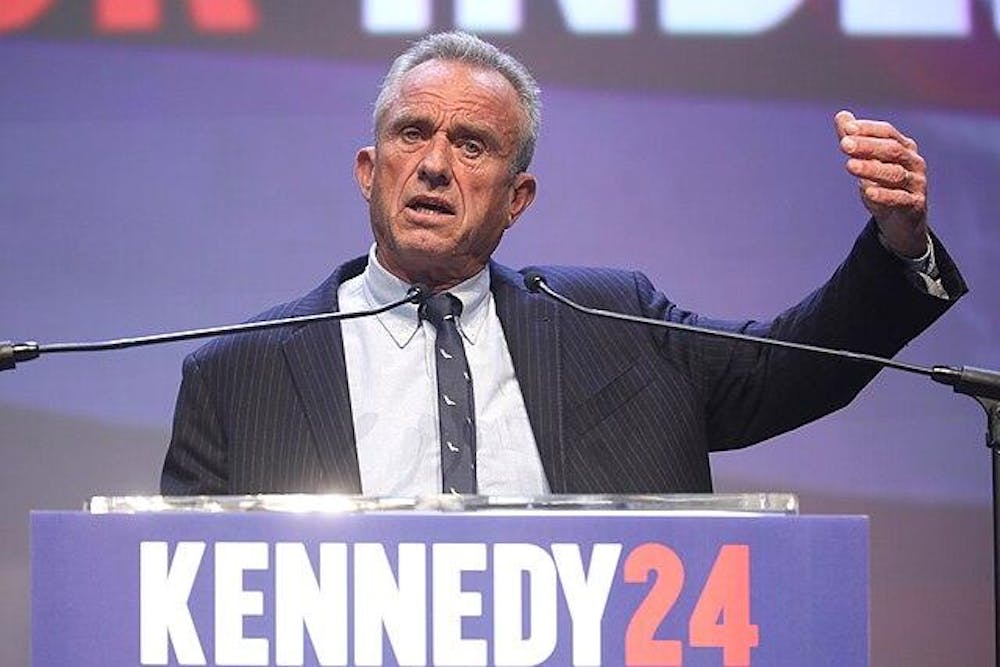At an October rally, now-president-elect Donald Trump said that he would let Robert F. Kennedy Jr., who has gained notoriety for his anti-vaccine views, embrace of raw milk, skepticism of HIV/AIDS and wish to remove fluoride from water, “go wild on health.” Last Thursday, Trump nominated Kennedy to be the Secretary of Health and Human Services.
The decision has elicited concern among public health experts, including Ashish Jha, the dean of Brown’s School of Public Health and former White House COVID-19 response coordinator.
“He is unusually unqualified to lead that agency,” Jha said in an interview with The Herald.
For Jha, it is not Kennedy’s lack of experience in public health that makes him an “extraordinarily bad choice,” but rather his track record of espousing “conspiracy theories” that have been “widely debunked.”
“None of the health secretaries in general have had public health experience,” Jha said. But, “they are generally people who have deferred scientific decisions to scientific experts.”
A spokesperson for the Trump-Vance transition team did not respond to The Herald’s request for comment.
In a statement announcing his nomination, Trump said that under Kennedy, HHS will mitigate the “overwhelming Health Crisis in this Country” and “Make America Great and Healthy Again!”
Kennedy has received media attention for his criticism of vaccines more generally in addition to spreading misinformation regarding the coronavirus and COVID-19 vaccines. He has also supported a disproven theory that there is a connection between childhood vaccines and autism.
On X, Kennedy wrote he is “not going to take anyone’s vaccines away from them,” but that he wants “to be sure every American knows the safety profile, the risk profile and the efficacy of each vaccine.”
Jha said ideas like these “sound good on a bumper sticker,” but in practice, Kennedy’s denial of scientific evidence makes him “dangerous” for the health of Americans.
“The problem is that he refuses to acknowledge that these vaccines have gone through rigorous testing, large clinical trials, and he will say things that are just false,” Jha said.
He also referred to Kennedy’s skepticism that HIV causes AIDS as one example in a “whole series of ideas” that are “quite off-base.”
“The way he approaches these issues, to me that’s the real concern,” Jha said. “His track record of falling prey to conspiracy theories and not using scientific evidence makes (me) very concerned that he will not make science based decisions.”
The HHS secretary oversees the Centers for Disease Control and Prevention, the Food and Drug Administration and Medicare. If confirmed by the Senate, Kennedy will have the power to overturn most FDA decisions.
“This goes well beyond vaccines,” Jha said, adding that the HHS secretary has authority to decide if preventative services like mammograms and colon cancer screening can be offered for free.
“People need to understand this is a big job, and he will have a lot of influence,” he added.
Kennedy would also be in charge of appointments to the FDA and CDC, including the committees setting vaccine recommendations.
While Kennedy “is going to be important, who the FDA commissioner is (and) who the CDC director is will also matter enormously,” Jha said, noting that both will report to Kennedy if he is confirmed.
For those worried about the future of health policy in America, Jha said that for now, public health experts should “remain calm.” He underlined how public health is a “long term effort” and that most policy decisions are made at the state level.
“One would hope that this would be a short term blip in what has generally been, I think, a lot of very good people running HHS, both Democrats and Republicans,” Jha said.
Jha is not the only public health expert to express these concerns. Erin Fuse Brown, a professor of health services, policy and practice, expressed similar concerns.
“I fear what will happen when a person who does not fundamentally trust science is placed in charge of health agencies that fundamentally rely on science to protect and advance the health of the entire population,” she wrote in an email to The Herald.
Jha said he hoped the Senate would not confirm Kennedy but emphasized the importance of remaining vigilant.
“At the end of the day, we should be critical of policies, not people,” Jha said. “Where his ideas or policies are harmful to the American people, I think we need to speak up about that.”

Elise Haulund is a science & research editor and sophomore from Redondo Beach, CA. Concentrating in English and biology, she has a passion for exploring the intersection between STEM and the humanities. Outside of writing, researching and editing, she enjoys ballet-dancing, cafe-hopping and bullet-journaling.





